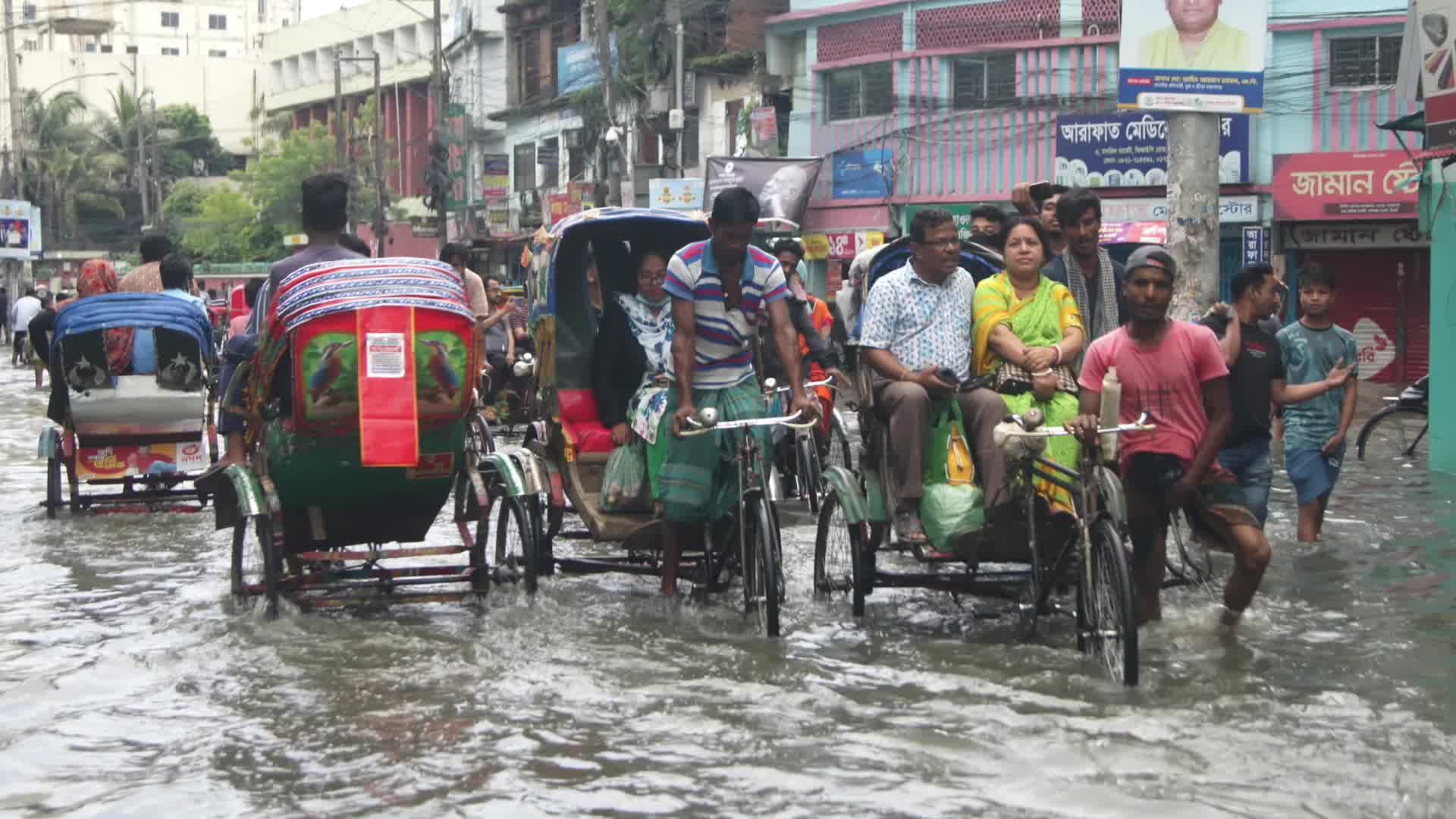Bangladesh
Rising flood risk threatens millions of people
For centuries, annual floods have been a part of life in the lowlands of Bangladesh.
With numerous rivers crisscrossing the country, the fertile mud from these floods has nourished the rice fields.
The people of Bangladesh have adapted to this constant flooding. However, the future holds even more extreme flood events.

Adding to the challenge is Bangladesh's vulnerability to rising sea levels. The country, situated just above sea level, faces the constant threat of coastal flooding that erodes its coastline. This vulnerability is amplified by the high population density in Bangladesh.
In particular, coastal and riverine communities in Bangladesh are highly vulnerable due to their low adaptive capacity and direct exposure to natural disasters such as regular flooding and erosion. Climate change will lead to significant changes. There will be more water than the soil can hold, so surface runoff will change in the future.
By 2050, surface runoff in Bangladesh could increase by 38 percent in a scenario with no climate policy, but decrease by six percent if global average temperatures are limited below 2.0°C. In a scenario with a temperature of 1.5 ºC, the change in surface runoff would be only two percent.
The impact of climate change on food security in Bangladesh is already significant, affecting millions of people. It is expected that food and water insecurity will further increase in the country. These challenges will be compounded by projected changes in rice yields during the two rice growing seasons.
Impacts of climate change
in Bangladesh
Shifts in monsoon precipitation
Flooding
Tropical cyclones
Droughts
Sea-level rise
Bangladesh is indeed one of the countries that bears a significant burden of the impacts of climate change, despite contributing relatively little to the greenhouse gas emissions causing it.
Hafijul Islam Khan, a lawyer and the Executive Director of the Centre for Climate Justice-Bangladesh (CCJ-B), sheds light on the profound implications of climate change for the people of Bangladesh.

What are the impacts of climate change that people in Bangladesh experience in their daily lives?
Hafijul Islam Khan
"In Bangladesh, people experience several climate change impacts in their daily lives. One significant impact is the increased frequency of floods, including both monsoon floods and flash floods. These floods occur due to heavy rains and the rivers in Bangladesh are unable to drain the excess water masses into the sea. This leads to overwhelming of rivers and can trigger landslides. The consequences of these floods are significant damage to crops.
Tidal waves, another consequence of climate change, also cause substantial damage to coastal infrastructure, crops, and result in the loss of lives.
Cyclones have become an annual occurrence in Bangladesh over the past decade, posing sudden-onset disasters that are clearly influenced by climate change.
Additionally, slow-onset processes such as sea-level rise and saltwater intrusion are observed. Coastal communities are already experiencing the effects of saltwater intrusion, which affects the drinking water supply and hampers crop growth due to the increased salinity.”
The effects are already visible. What are the potential future impacts for Bangladesh if greenhouse gas emissions continue at high levels?
Hafijul Islam Khan
"If greenhouse emissions continue at high levels, it would be a total disaster. The rising sea-levels will pose a major problem in Bangladesh.
The country is witnessing disasters every year, such as cycles and floods. However, it is extremely difficult to adapt to this kind of impact. In the coastal areas, we have to relocate people. Relocating people from coastal areas is not a straightforward solution due to the limited options in our small country. For example, coastal fisher folk are accustomed to their way of life and livelihoods along the coast. Moving them to mountainous regions and teaching them new farming practices would be a challenge and could lead to conflicts with receiving communities. So there will be social unrest. Honestly, I have been working at the community level for many years, I don't know how to effectively address these issues.
Therefore, a significant reduction of greenhouse gas emissions is crucial. At the same time, vulnerable countries like Bangladesh require support to adapt. Additionally, there is a need to address the permanent losses and damages caused by climate change. These steps are necessary for Bangladesh to prepare for the next 50 or 100 years."
You have depicted a frightening image of floods. Could you describe the consequences that people experience as a result of these floods?
Hafijul Islam Khan
"In May and June of 2022, unfortunately, flash floods occurred in the northeast of Bangladesh. Such flash floods are very risky because the poor farmers have lost their crops and cannot invest in the next crop. They simply do not have the money to do this. As a consequence, people from the flooded areas are forced to move to the nearby towns to search for work. Many resort to working as rickshaw pullers which is the easiest profession to adapt to. This kind of work is extremely demanding and physically challenging, which is inhumane.
This is already apparent in Bangladesh where migration is a classic example of the consequences of these climate-related sudden-onset events."
Floods in Bangladesh are already inflicting significant losses and damages. Is it possible to quantify the extent of these losses and damages?
Hafijul Islam Khan
"Assessing and quantifying the loss and damage caused by climate change impacts is an immensely critical question.One of the primary challenges lies in the field of attribution science which aims to determine the extent to which a particular sudden-onset disaster or slow-onset process can be attributed to climate change. Additionally, there is the challenge of accurately qualifying and quantifying the specific loss and damage that arises as a direct result of the effects of climate change.
Nevertheless, we are initiating a litigation process. Our objective is to identify vulnerable communities in coastal zones who have the potential to file litigation, not at the national jurisdiction, but also in international jurisdictions.""
As a lawyer, could you provide an explanation of the importance of climate justice?
Hafijul Islam Khan
"It is essential to acknowledge the disproportionate contribution of the developed country parties to the cause of climate change while the principle of “polluter pays” is not recognized yet.
Simultaneously, we must recognize the disproportionate impacts and vulnerabilities faced by vulnerable developing countries, particularly least developing countries like Bangladesh.
To achieve climate justice, there is a need for proportionality - based on the historical responsibility of developed countries. It is crucial that polluter countries provide financial, technical, and capacity-building support to the vulnerable developing countries.
However, holding polluting countries liable or obligated is not a simple task. Developing international law policies based on consensus is necessary to address this challenge.
In this context, developing countries must adopt a strategic approach. They have to define their technical demands clearly and develop negotiation strategies with developed country partners. These negotiations serve as the foundation for developing further policies."